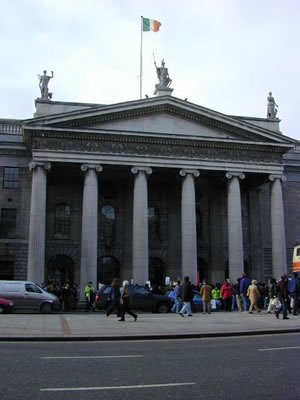The most famous song about the 1916 rising, and probably the best one has connections with Newry and Mourne.
It was written by Canon O’Neill who was born Patrick O’Neill in Portgenone in 1887 and was ordained in 1912. He became parish priest of Kilcoo outside Hilltown in 1941 and was later P.P. of Newcastle from 1955-1960.
The then Father O’Neill was inspired to write the song subsequent to a visit to the First Dail in Dublin in 1919 when he was moved by the number of Deputies who were “Faoi glas ag na Sasanaigh.” (Locked up by those champions of small nations the English). In contrast to noisy rebel songs or thrashy British army doggerel barrack songs, “The Foggy Dew” is dignified but defiant, rather than rousing; the words are poignant. There are several different versions but the one below is perhaps the most popular. The air is borrowed from a McCormack love song:
As down the Glen one Easter morn, to a city fair rode I
There armed lines of marching men in squadrons passed me by,
No pipe did hum, no battle drum rang out its wild tatoo
But the Angelus Bell o’er the Liffey swell
Rang out through the Foggy Dew.
Right proudly high over
They flung out the flag of war
‘Twas better to die ‘neath an Irish sky
Than at Suvla or Sud-el-Bar
And from the plains of royal Meath
Strong men came hurrying through
While Britannia’s Huns with their long range guns
Poured hell through the Foggy Dew.
The night fell black and the rifle crack
made perfidious
Through the leaden rain seven tongues of flame
shone out o’er the lines of steel
By each shining blade a prayer was said
that to
And when morning broke still the war flag shook
its folds through the Foggy Dew.
The bravest fell and the requiem bell
rang mournfully and clear
For those who died that Eastertide
In the springing of the year
And the world did gaze in deep
At those fearless men but few
Who fought the fight that freedom’s light
Might shine through the Foggy Dew.
‘Twas
That small nations might be free
But their lonely graves are by Suvla’s waves
Or the fringe of the great
Oh! had they died by Pearse’s side
Or fought with Cathal Brugha
Their graves we would keep where the Fenians sleep
Neath the shroud of the Foggy Dew.
Back through the glen I rode again,
My heart with grief was sore
For those gallant lines of marching men
I never would see more
But to and fro in my grief I go
I kneel and I pray for you
For slavery fled O most glorious dead
When you fell in the Foggy Dew.
Canon O’Neill died in 1963 and is buried behind St.Mary’s Church in
It is not widely known that Newry men took part in the rising. A recent account of the history of the IRA in S.Down/S.Armagh mentions Johnny Southwell, but omits George Cahill (an Uncle of Joe Cahill), who stole his nephew’s bike to cycle to
Newry Post Office was guarded against possible attack by Redmondite Volunteers who were jeered at by local republican-minded youth.
